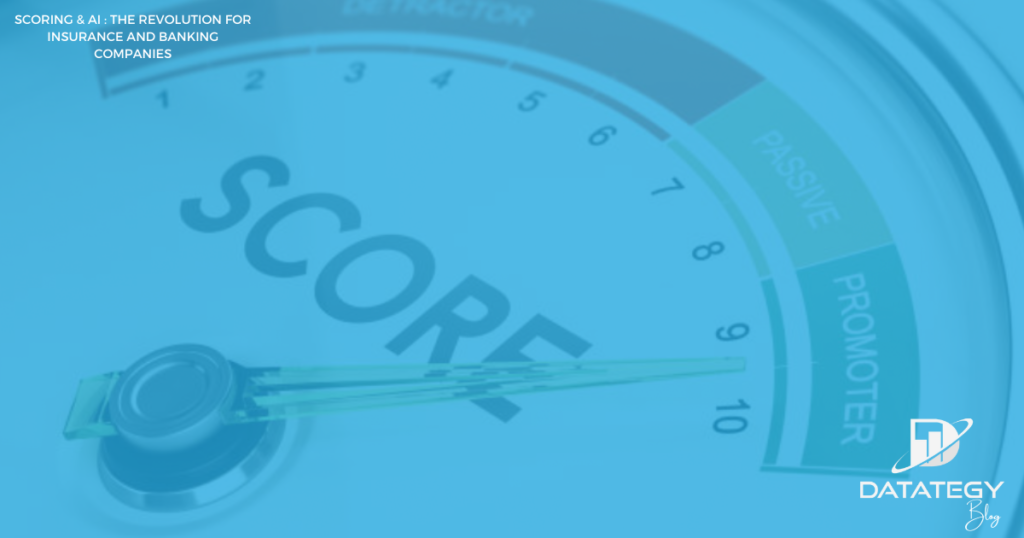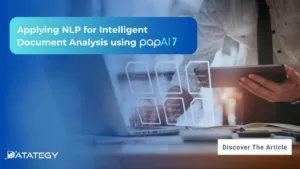Scoring & AI : the revolution for insurance and banking companies
Table of Contents
ToggleIn general, scoring refers to the process of assigning a rating to a customer based on several criteria. The score will then be used to build a profile of the person.
It is a useful tool in marketing, but can also be used in the financial sector.
For the credit market, scoring makes it possible to assign a risk profile to the future borrower and allow the creditor to decide to grant a loan or not, but also to define the rate or the guarantee.
Find out how papAI can improve the deployment of AI projects in the Insurance Sector here.

How does the credit scoring system work?
For insurances, a credit score is calculated and used to define the likelihood of a client filing a claim while covered.
This score affects the insurance premium costs to each client. A low score reflects a higher risk and therefore higher premiums, and vice versa.
For banks, lenders use a system to measure the ability of a borrower to repay the loan. This system is created by assigning points to various attributes related to the creditworthiness of the applicant.
To give an example, here are some of the factors taken into account when calculating the credit score for banks.
- The number of accounts you own
- The types of accounts
- Your used credit compared to your available credit
- The length of your credit history
- Your payment history
Of course, the impact of each factor can vary, depending on the rating model.
The use of AI in credit scoring
To improve their scoring, more and more companies started to use AI to build effective models based on a lot of data, such as total income, transaction analysis, work experience, and even Google Analytics.
The major advantage of AI-based credit scoring is that it provides more sensitive and individualized evaluations based on a set of additional factors in real time.
Traditional credit scoring methods focus on the borrower’s historical data.
The client must therefore have sufficient historical data to be classified as “scorable”. For this reason, sometimes creditworthy borrowers are denied access to credit because they are new customers with no history.
In contrast, AI credit scoring allows accurate predictions, which enables the inclusion of high potential new borrowers.
Here are some advantages of the use of AI in this field :
- With the introduction of AI, companies are provided with personalized information on the financial behavior of their customers, based on their historical data, but also on the forecast of potential revenues. This allows better segmentation of customers and therefore pricing and selling their credit products to the right categories of customers.
- AI applications can speed up the process of making lending decisions, while ensuring the quality of the model. With this new software, a huge volume of unstructured and partially structured data are included in the analysis, such as mobile phone activity. This allows for smarter credit decisions, while maintaining high data processing speed.
- Data science is giving more people access to credit, such as students and promising business start-ups. In addition, it simplifies the process of obtaining a first loan by making projections about the client’s potential income and employment opportunities, using AI.
- The use of AI tools for scoring allows the number of clients to increase while decreasing risk. It also allows banks or insurances to focus on maximising margin instead of minimising risk.
How can papAI be used in scoring ?
Of course, AI can be used in many other fields than banking or insurance.
Infogreffe is the economic interest grouping of the clerks of the French commercial courts. One of its missions is to study the balance sheets of companies in order to assess their level of exposure to risk by analyzing over fifteen indicators. This makes it even possible to make a one-year forecast !
Infogreffe has decided to go further and carry out these assessments on a daily basis. It is in this context that the use of Artificial Intelligence was considered.
Thanks to our papAI solution, we enable them to analyze data from more than ten heterogeneous databases. Every day, a score from 0 to 100 is given to each company thanks to the analysis of about fifteen ratios, both sectoral and topical (the Covid for example). The data is updated in real time.
This allows the courts to be proactive and to be able to propose the most appropriate solutions to companies as soon as possible.
Interested in discovering papAI?
Our commercial team is at your disposal for any question


